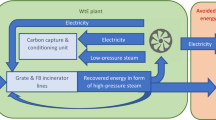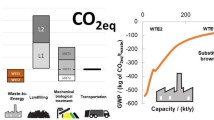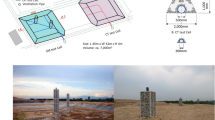Abstract
This paper focuses on the comparison of waste-to-energy processes in terms of life cycle analysis. The processes compared are the municipal solid waste (MSW) direct combustion (known as mass burning) and the combustion of refused derived fuel (RDF) produced after separation of recyclable materials in a mechanical–biological treatment (MBT) facility. The basis of comparison for the two processes in this paper is their global warming potential (GWP). In specific, three European countries (Greece, Germany and France) were chosen as case studies. Their selection was based on their electricity mix characteristics and the general population culture toward waste management practices, as depicted in the waste composition. The waste composition applied for each country is the average estimated by local statistics and Eurostat data. The comparison between the two methods of incineration leads to the conclusion that the incineration of RDF has less impact on the greenhouse effect than the incineration of MSW. A sensitivity analysis based on different setup configurations for paper and plastic separation in the MBT plant was carried out. The results validate the priorities of waste management hierarchy, since the scenarios with high separation of valuable materials, such as paper and plastics, were environmentally friendlier in terms of GWP impact. The sensitivity analysis based on the change of the recovering rate shows an approximately linear relation of inverse proportion between recovering rate and total environmental impact. Furthermore, the increase in electricity efficiency plays a significant role in the greenhouse effect for the Greek scenario, while its respective effectiveness for the French scenario is lower. Since the final choice between the two processes relies solely upon the needs that should be met on specific occasions, the modeling has been carried out through life cycle analysis principles, in order to provide a decision-making tool for the selection of the most appropriate waste-to-energy technology according to the criteria that be set.







Similar content being viewed by others
Abbreviations
- eq:
-
Equivalent
- e:
-
Electrical
- NG:
-
Natural gas
References
European Commission: Directive EC 2008/98 http://ec.europa.eu/environment/waste/framework/ (2008). Accessed on 30 Aug 2013
Rigamonti, L., Grosso, M., Giugliano, M.: Life Cycle assessment for optimizing the level of separated collection in integrated MSW management systems. Waste Manag. 29(2), 934–944 (2009)
Stehlík, P.: Up-to-date technologies in waste to energy field. Rev. Chem. Eng. 28, 223–242 (2012)
CEN/TC 343 2006, CEN/TS 15359:2006 Solid recovered fuels—specifications and classes, European Committee for Standardisation, Technical Committee CEN/TC 343
European Recovered Fuel Organization (ERFO). http://erfo.info/ (2010). Accessed 7 Mar 2015
European Commission: Energy and Environmental Statistics. Published by Eurostat. http://epp.eurostat.ec.europa.eu/portal/page/portal/eurostat/home/. Accessed on 5 Sept 2013
Assamoi, B., Lawryshyn, Y.: The environmental comparison of landfilling vs. incineration of MSW accounting for waste diversion. Waste Manag. 32(5), 1019–1030 (2012)
Yang, N., Zhang, H., Chen, M., Shao, L.-M., He, P.-J.: Greenhouse gas emissions from MSW incineration in China: impacts of waste characteristics and energy recovery. Waste Manag. 32, 2552–2560 (2012)
Consonni, S., Giugliano, M., Grosso, M.: Alternative strategies for energy recovery from municipal solid waste. Part A: mass and energy balances. Waste Manag. 25, 123–135 (2005)
Ekvall, T., Assefa, G., Bjorklund, A., Ericksson, O., Finnveden, G.: What life cycle does and does not do in assessments of waste management. Waste Manag. 27, 986–996 (2007)
Liamsanguan, Ch., Gheewala, HSh: LCA: a decision support tool for environmental assessment of MSW management systems. J. Environ. Manag. 87(1), 132–138 (2008)
De Feo, G., Malvano, C.: The use of LCA in selecting the best MSW management system. Waste Manag. 29(6), 1901–1915 (2009)
Cherubini, F., Bargigli, S., Ulgiati, S.: Life cycle assessment (LCA) of waste management strategies: landfilling, sorting plant and incineration. Energy 34, 2116–2123 (2009)
Blengini, G.A., Fantoni, M., Busto, M., Genon, G., Zanetti, M.C.: Participatory approach, acceptability and transparency of waste management LCAs: case studies of Torino and Cuneo. Waste Manag. 32, 1712–1721 (2012)
Buttol, P., Masoni, P., Bonoli, A., Goldoni, S., Belladonna, V., Cavazzutti, C.: LCA of integrated MSW management systems: case study of the Bologna District. Waste Manag. 27, 1059–1070 (2007)
Cherubini, F., Bargigli, S., Ulgiati, S.: Life cycle assessment of urban waste management: energy performances and environmental impacts. The case of Rome, Italy. Waste Manag. 28, 2552–2564 (2008)
Miliūtė, J.: Application of life cycle assessment in optimization of municipal waste management systems: the case of Lithuania. Waste Manag. Res. 28, 298–308 (2010)
Song, Q., Wang, Z., Li, J.: Environmental performance of municipal solid waste strategies based on LCA method: a case study of Macau. J. Clean. Prod. 57, 92–100 (2013)
Wittmaier, M., Langer, S., Sawilla, B.: Possibilities and limitations of life cycle assessment (LCA) in the development of waste utilization systems—applied examples for a region in Northern Germany. Waste Manag. 29(5), 1732–1738 (2009)
Woon, K.S., Lo, M.C.: Greenhouse gas accounting of the proposed landfill extension and advanced incineration facility for municipal solid waste management in Hong Kong. Sci. Total Environ. 458–460, 499–507 (2013)
Cimpan, C., Wenzel, H.: Energy implications of mechanical-biological treatment compared to direct waste-to-energy. Waste Manag. 33, 1648–1658 (2013)
Bjarnadóttir, H., Friðriksson, G., Johnsen, T., Sletsen, H.: Guidelines for the use of LCA in the waste management sector. Published by Nordtest. http://infohouse.p2ric.org/ref/37/36469.pdf. Accessed 20 Jan 2014
ISO 14041-14044. Environmental Management. Life Cycle Assessment. Requirements and Guidelines (2006)
Skovgaard, M., Hedal, N., Villanueva, A, Andersen, F.M., Larsen, H.: Municipal waste management and greenhouse gases. Publishing in ETC/RWM working paper. http://www.risoe.dk/rispubl/art/2008_27.pdf (2008). Accessed 10 Jan 2014
Consonni, S., Giugliano, M., Grosso, M.: Alternative strategies for energy recovery from municipal solid waste: part B: emission and cost estimates. Waste Manag. 25(2), 137–148 (2005)
European Commission, 2007. Commission Decision of 18 July 2007 establishing guidelines for the monitoring and reporting of greenhouse gas emissions pursuant to Directive 2003/87/EC of the European Parliament and of the Council (notified under document number C(2007) 3416)
Intergovernmental Panel on Climate Change (IPCC). http://www.ipcc.ch (2007)
Scipioni, A., Mazzi, A., Niero, M., Boatto, T.: LCA to choose among alternative design solutions: the case study of a new Italian incineration line. Waste Manag. 29(9), 2462–2474 (2009)
Hellenic Ministerial Decision (HMD). 50910/2727/2003 (Government Gazette1909/22.12.2003), Rules and Terms for the Solid Waste Management, National and Regional Management Plan; 2003 [in Greek]
Koufodimos, G., Samaras, Z.: Waste management options in southern Europe using field and experimental data. Waste Manag. 22, 47–59 (2002)
Minoglou, M., Komilis, D.: Optimizing the treatment and disposal of municipal solid wastes using mathematical programming—a case study in a Greek region. Resour. Conserv. Recycl. 80, 46–57 (2013)
Beylot, A., Villeneuve, J.: Environmental impacts of residual Municipal Solid Waste Incineration: a comparison of 110 French incinerators using a life cycle approach. Waste Manag. 33(12), 2781–2788 (2013)
Muhle, S., Balsam, I., Cheeseman, C.R.: Comparison of carbon emissions associated with municipal solid waste management in Germany and the UK. Resour. Conserv. Recycl. 54, 793–801 (2010)
Reimann, D.O.: CEWEP Energy Reports III (status 2007–2010): results of Specific Data for Energy, R1 Plant Efficiency Factors and NCV of 314 European W-t-E Plants. CEWEP, Bamberg (2012)
Grosso, M., Motta, A., Rigamonti, L.: Efficiency of energy recovery from waste incineration in the light of the new Waste Framework Directive. Waste Manag. 30, 1238–1243 (2010)
European Commission, 2006. Reference Document on the Best Available Techniques for Waste Incineration. http://eippcb.jrc.ec.europa.eu/reference Accessed Feb 2014
Consonni, S., Vigano, F.: Waste gasification vs. conventional Waste-To-Energy: a comparative evaluation of two commercial technologies. Waste Manag. 32, 663–666 (2012)
IPCC 2006: IPCC Guidelines for National Greenhouse Gas Inventories. In: Waste, vol. 5 Available from World Wide Web: http://www.ipcc-nggip.iges.or.jp/public/gp/english. Accessed Feb 2014
Astrup, T., Moller, J., Fruergaard, J.: Incineration and co-combustion of waste: accounting of greenhouse gases and global warming contributions. Waste Manag. Res. 27(8), 789–799 (2009)
AEA: UK Greenhouse Gas Inventory, 1990–2004: Annual Report for Submission Under the Framework Convention on Climate Change. DEFRA, UK (2006)
Velis, C.A., Longhurst, P.J., Drew, G.H., Smith, R., Pollard, S.J.T.: Biodrying for mechanical-biological treatment of wastes: A review of process science and engineering. Bioresour. Technol. 100(11), 2747–2761 (2009)
Merrild, H., Damgaard, A., Christensen, T.H.: Recycling of paper: accounting of greenhouse gases and global warming contributions. Waste Manag. Res. 27, 746–753 (2009)
Astrup, T., Fruergaard, T., Christensen, T.H.: Recycling of plastic: accounting of greenhouse gases and global warming contributions. Waste Manag. Res. 27, 763–772 (2009)
Prognos in Co-operation with institute of Environmental research university of Dortmund: Resource savings and CO2 reduction potential in waste management in Europe and the possible contribution to the CO2 reduction target in 2020, Final report. http://www.prognos.com/fileadmin/pdf/publikationsdatenbank/SUMMARY_Resource_savingsand_CO2_reduction_potentials_200810.pdf (2008). Accessed on 30 Aug 2013
Damgaard, A., Larsen, A.W., Christensen, T.H.: Recycling of metals: accounting of greenhouse gases and global warming contributions. Waste Manag. Res. 27, 773–780 (2009)
Larsen, A.W., Merrild, H., Christensen, T.H.: Recycling of glass: accounting of greenhouse gases and global warming contributions. Waste Manag. Res. 27, 754–762 (2009)
Heyer, K.-U., Hupe, K., Stegmann, R.: Methane emissions from MBT landfills. Waste Manag. 33, 1853–1860 (2013)
Harborth, P., Fuss, R., Munnich, K., Flessa, H., Fricke, K.: Spatial variability of nitrous oxide and methane emissions from an MBT landfill in operation: strong N2O hotspots at the working face. Waste Manag. 33, 2099–2107 (2013)
Obersteiner, G., Binner, E., Mostbauer, P., Salhofer, S.: Landfill modeling in LCA—a contribution based on empirical data. Waste Manag. 27(8), 58–74 (2007)
Devera, S.A., Swarbricka, G.E., Stuetza, R.M.: Passive drainage and biofiltration of landfill gas: Australian field trial. Waste Manag. 27, 277–286 (2006)
Manfredi, S., Tonini, D., Christensen, T.H., Scharff, H.: Landfilling of waste: accounting of greenhouse gases and global warming contributions. Waste Manag. Res. 27, 825–836 (2009)
Kong, D., Shan, J., Iacoboni, M., Maguin, S.R.: Evaluating greenhouse gas impacts of organic waste management options using life cycle assessment. Waste Manag. Res. 30(8), 800–812 (2012)
Seventeenth Ordinance on the Implementation of the Federal Immission Control Act (Ordinance on Waste Incineration and Co-Incineration-17. BlmSchV), of November 1990 (Federal Law Gazette I p. 2545, 2832) corrected on 14 August 2003 (Federal Law Gazette I p. 1633)
CEN/TS 15440 Technical Specification. Solid recovered fuels-Method for the determination of biomass content (2006)
Author information
Authors and Affiliations
Corresponding author
Rights and permissions
About this article
Cite this article
Kourkoumpas, DS., Karellas, S., Kouloumoundras, S. et al. Comparison of Waste-to-Energy Processes by Means of Life Cycle Analysis Principles regarding the Global Warming Potential Impact: Applied Case Studies in Greece, France and Germany. Waste Biomass Valor 6, 605–621 (2015). https://doi.org/10.1007/s12649-015-9367-2
Received:
Accepted:
Published:
Issue Date:
DOI: https://doi.org/10.1007/s12649-015-9367-2




